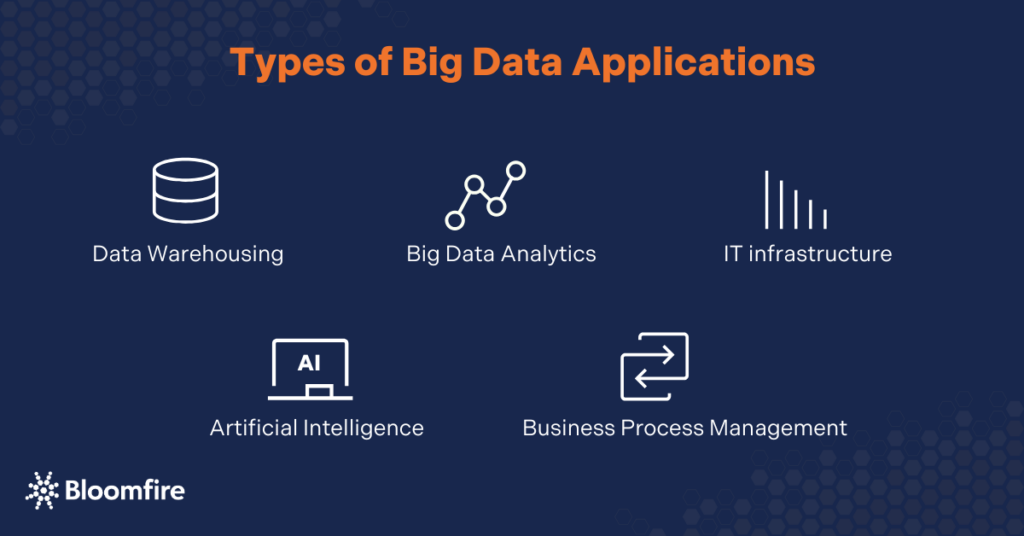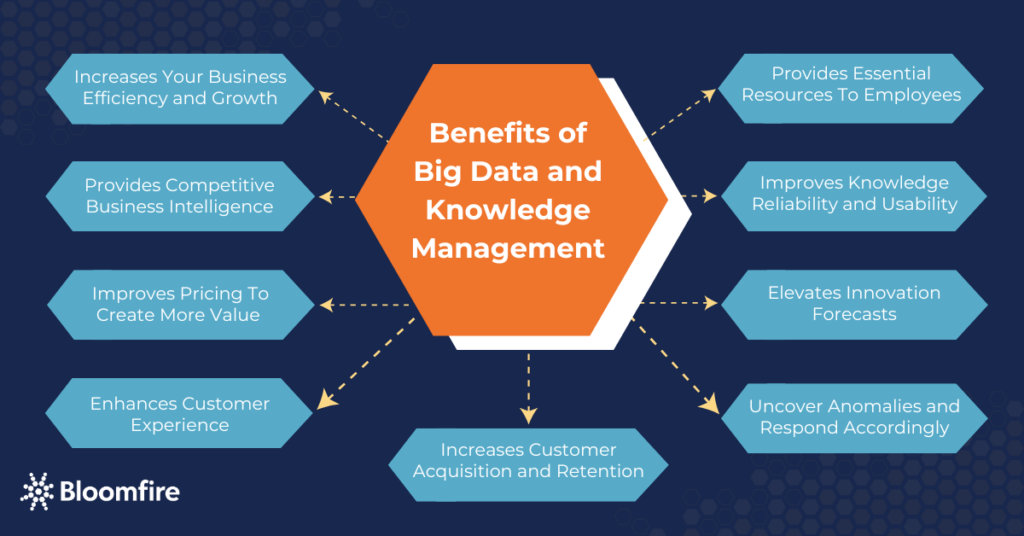What Are Big Data and Knowledge Management? (+9 Key Benefits)
Data is one of your organization’s most valuable assets. As it grows continually, it will become difficult for organizations to utilize and consume it because of its sheer size. To transform all your company data into meaningful business outcomes, you have to categorize it, synthesize its insights, and create an effective way to share them. This is where big data and knowledge management (KM) come together.
Big data platforms allow organizations to store large amounts of information that is organized enough to extract valuable insights. Meanwhile, a KM platform will enable you to store and use these insights based on relevance. Employees can use your company’s most important information according to their needs.
Learn more about the relationship between big data and knowledge management and how combining these two capabilities can unlock transformative business outcomes.
What Is Big Data?
Big data refers to giant data sets that are too large for traditional software tools to capture, manage, and process. Three defining characteristics distinguish big data from traditional data: volume, velocity, and variety, also known as the 3Vs.
- Volume: It denotes the scale of data being generated and stored. This encompasses datasets measured in orders of magnitude exceeding traditional data volumes, ranging from terabytes and petabytes to exabytes and beyond.
- Velocity: It is the speed at which data is collected and processed. It covers the data flow rate, from creation and capture to analysis and utilization. This big data property highlights the need for systems that can handle continuous, high-speed data ingestion and processing.
- Variety refers to the types and formats of data. In the business sector, data comes in various forms and is often categorized as structured or unstructured. Structured data is usually quantitative, while unstructured data is qualitative.
Big data’s size, type, and speed warrant special technologies and expertise for accurate management. Companies use databases to collect and store data from various sources.
Big data may be used in various applications, such as data warehousing, big data analytics, business process management, artificial intelligence, and IT infrastructure.

Large sets of data or information guide improving business processes and the customer experience. However, without an efficient way to store the relevant insights derived from big data, vital information can be difficult to find. This is where knowledge management comes in.
How Knowledge Management Connects Data to Actionable Insights
Knowledge management (KM) involves collecting, sharing, and managing information, including insights from big data. This critical business process ensures your workforce can access the organization’s collective knowledge through a KM system that allows you to store and organize information. As a result, your teams can continuously learn, collaborate, and become better aligned.
Advanced KM platforms leverage technologies like artificial intelligence (AI), machine learning, and enterprise search to extract meaning from large datasets. AI-powered systems automatically categorize and tag content, enabling better search relevance and personalized recommendations. Enterprise search tools index diverse data sources, making even complex datasets searchable in seconds.
By transforming scattered data into actionable insights, companies can transform these large datasets into easily accessible, actionable information to help improve business processes.
The Benefits of Using Big Data and Knowledge Management
The tandem between big data and knowledge management refines information, making it easy to use to improve productivity and decision-making. Big data provides the raw materials – massive datasets that, when analyzed, reveal hidden patterns, customer preferences, and market trends. KM systems capture this valuable insight, along with existing company knowledge, making it easily accessible to employees.

Specifically, you’ll uncover the benefits of leveraging big data and knowledge management in the following ways.
1. Increases Your Business Efficiency and Growth
Digital tools provide employees, stakeholders, and decision-makers with access to crucial information. They help you dig and share insights that can improve nearly every facet of your business. They empower informed decision-making, leading to process optimization, innovative product development, and targeted marketing strategies. These impacts streamline business operations and ultimately drive growth.
2. Provides Competitive Business Intelligence
Insights help businesses better understand what’s happening in the market to improve their positioning and maintain a competitive advantage. The synergy between knowledge management and data analytics helps business leaders predict future trends and optimize their strategies. In fact, big data and knowledge management provide reporting that combines the quantitative and qualitative nature of success metrics.
3. Improves Pricing To Create More Value for Customers
Big data and insights can improve products and features, cut production costs, and pass value to customers. This data-driven approach allows businesses to implement dynamic pricing models, personalize offers, and optimize discounts, creating more value for customers by offering the right price at the right time.
4. Enhances Customer Experience
Businesses use insights about their customers derived from big data to deliver better and more tailored customer experiences. For example, an online retailer can use big data insights to track a customer’s browsing history and purchase patterns. This information can be used to recommend relevant products, offer personalized discounts, and provide proactive customer support.
5. Increases Customer Acquisition and Retention
With the tools to gain insight into customers’ preferences and behavior, companies can improve services and create personalized offers that are more likely to target ideal customers. This data-driven approach helps attract new customers by creating customized marketing campaigns and improves retention by providing a more satisfying and tailored customer journey.
6. Provides Essential Resources To Employees
Data collected within a company represents the knowledge required to develop the brand’s products or services. By making the data easily accessible with a reliable internal knowledge base, employees can rely on it to improve their decision-making and ensure they are aligned around the same information as the rest of the organization.
7. Improves Knowledge Reliability and Usability
Pairing big data and knowledge management increases the credibility of information as the raw data becomes a solid foundation for intelligent insights. This setup allows decision-makers from across the organization to gain a more holistic view of the business and make better-informed decisions. As a result, your team will have greater confidence in the accuracy of your internal information system.
8. Elevates Innovation Forecasts
Companies constantly examine processes and technologies used by businesses to maintain momentum. When it’s easily accessible through a knowledge platform, management teams can identify strengths and weaknesses and explore technologies and business strategies that could improve performance in the future.
9. Uncover Anomalies and Respond Accordingly
Leveraging big data processed into valuable knowledge can help detect business outliers and predict potential risks, leading to the right solution. Big data helps spot the anomalies, while database and knowledge management help explain them and guide the response.
Big data and knowledge management rely on entirely different technologies for implementation. But when used together, they create powerful tools that improve business processes and performance.
Future of Enterprise Data Management
As organizations scale, their data environments grow increasingly complex. Enterprises must adopt cloud-native, AI-powered KM platforms that seamlessly integrate with data storage, analytics, and business intelligence tools. This integrated approach enables real-time data processing and continuous knowledge updates, creating a system where insights are always current, relevant, and accessible.
Big Data and Knowledge Management in a Nutshell
Data alone doesn’t drive success—its power comes from how well an organization can extract, organize, and operationalize insights at scale. The combination of big data technologies and knowledge management platforms ensures that critical business information is stored and made actionable through advanced search, AI-powered recommendations, and continuous data integration.
The merging of big data and KM isn’t just a competitive advantage—it’s an operational necessity. Organizations prioritizing data-driven decision-making will be better equipped to adapt, innovate, and lead in today’s digital world.
Note: This blog post was originally published on Dec 22, 2022. It was most recently expanded and updated in December 2024.
Enhance Your KM Dexterity
Know how to complement big data with knowledge management through an expert guide.
Learn More
10 Best Knowledge Management Practices in 2026

Different Types of Knowledge: Implicit, Tacit, and Explicit

Striking the Right Balance Between AI and Human Customer Service

Estimate the Value of Your Knowledge Assets
Use this calculator to see how enterprise intelligence can impact your bottom line. Choose areas of focus, and see tailored calculations that will give you a tangible ROI.

Take a self guided Tour
See Bloomfire in action across several potential configurations. Imagine the potential of your team when they stop searching and start finding critical knowledge.